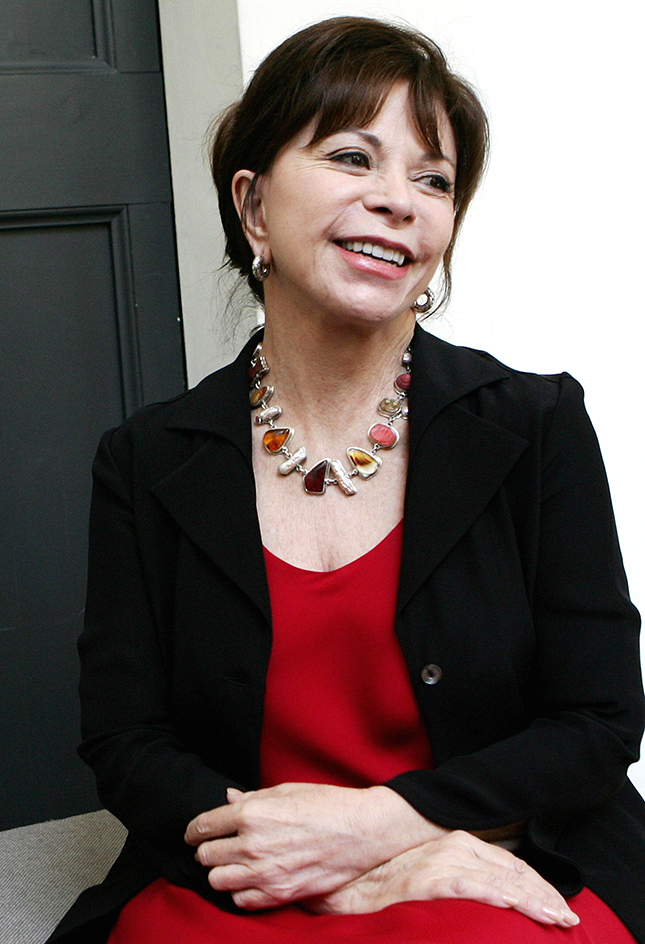Allende, Isabel << ah YEHN day, IHZ uh behl >> (1942-…), is a leading novelist and journalist from Chile. Her novels and short stories, which were first published in the 1980’s, have won her international fame and several literary awards. In 2014, Allende received the Presidential Medal of Freedom, one of the highest civilian honors in the United States.

Allende was a journalist and television reporter in Chile in the 1960’s before joining the staff of the women’s magazine Paula in 1967. In 1970, her cousin and godfather, Salvador Allende Gossens, a socialist politician, was democratically elected president of Chile. In September 1973, Salvador Allende was overthrown and died during a right-wing military coup led by army general Augusto Pinochet Ugarte. The Allende family fled Chile, and Isabel moved to Venezuela, where she worked as a journalist. In 1983, she moved to the United States, where she held various university teaching posts while still pursuing her literary career.
Allende’s first novel, The House of Spirits (1982), is a direct reflection of her experiences in Chile during the time of the Pinochet coup and her later separation from her family. The novel arose out of a letter she wrote during 1981 to her dying grandfather, who had stayed in Chile. The letter recounted all the memories she had that would keep the old man alive for her. The House of Spirits became a best seller, and Allende won great critical acclaim. Her work was compared with that of the eminent Colombian novelist Gabriel García Márquez.
Allende’s other works, also steeped in Chile’s turbulent history, include two more novels, Of Love and Shadows (1984) and Eva Luna (1989); and the short-story collections Tales of Eva Luna (1990) and The Infinite Plan (1992). Daughter of Fortune (2000) is a historical romance about a Chilean-born woman searching for her lover in California during the 1849 gold rush. Portrait in Sepia (2001) is a family chronicle set in Chile and California from 1862 to 1910. It draws on characters from The House of Spirits and Daughter of Fortune.
Allende’s historical novel Zorro (2005) portrays a dashing hero in California during the early 1800’s. Another historical novel, Inés of My Soul (2006), is set during the Spanish conquest of the Inca Empire in the 1530’s. Allende’s novel Island Beneath the Sea (2010) portrays a slave revolt in Haiti. In the novel Maya’s Notebook (2013), a woman flees to an island off of Chile’s coast to escape from assassins and law enforcement agents. Ripper (2014) is a mystery novel that features a child detective. The Japanese Lover (2015) is a decades-long love story about a woman from Poland and her one-time Japanese gardener. In the Midst of Winter (2017) is about three characters with Latin American roots whose lives become intermingled after they meet in New York City. Long Petal of the Sea (2020) is about refugees who flee to Chile to escape the Spanish Civil War (1936-1939). In Violeta (2022), a 100-year-old woman tells her life story. The Wind Knows My Name (2023) tells two connected stories of refugee children being separated from their parents.
Allende wrote Paula (1995) in the form of a letter to her daughter, Paula, who was dying of an inherited blood disease. She also wrote a children’s story, La Gorda de Porcelana (The Porcelain Fat Lady) (1984). For young adults, she wrote the trilogy of novels City of the Beasts (2002), Kingdom of the Golden Dragon (2004), and Forest of the Pygmies (2005). In 1997, Allende completed Afrodita: cuentos, recetas y otros afrodisíacos (translated as Aphrodite: A Memoir of the Senses), a nonfiction collection of writing about the history of love potions, which also included recipes. Allende wrote a memoir called My Invented Country: A Nostalgic Trip Through Chile (2003), as well as the related memoir The Sum of Our Days (2008).
Isabel Allende was born on Aug. 2, 1942, in Lima, Peru, where her father was a diplomat. Following the divorce of her parents, her mother took her back to live in Chile, where she lived from the age of 3 until their exile to Venezuela in 1973.
